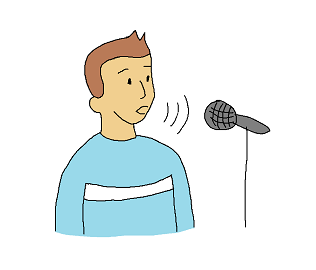Audio or voice solution of the task

An educational oral response is a form of active student participation in the learning process, in which he verbally answers questions from a teacher or presents his knowledge and research on a specific topic. It is one of the main tools for assessing a student's knowledge and skills.
The purpose of the educational oral response is to test the student's understanding of the material being studied, his ability to express his thoughts in a reasoned manner and use the knowledge gained in practical situations. It also helps to develop the student's skills of public speaking, logical thinking and information analysis.
The structure of the educational oral response
An educational oral response usually has the following structure:
Introduction
The introduction in the oral response is a short introduction in which the student explains the topic he will be discussing. He can define a topic or describe its importance and relevance.
The main part
The main part of the oral response consists of several paragraphs or paragraphs in which the student presents his knowledge and arguments on the topic. Each item may contain a definition, properties, examples, or illustrations that help explain and illustrate the main ideas.
Conclusion
The conclusion of the oral response is a brief summary and generalization of the main ideas presented in the main part. The student can also express his opinion or draw conclusions based on the information provided.
It is important to remember that the structure of the oral response may vary depending on the specific task or the requirements of the teacher. However, the general structure, including the introduction, the main part and the conclusion, is the basis for the organization of information and the logical presentation of knowledge.
Linguistic features of the educational oral response
The educational oral response has its own peculiarities in the use of language. Here are some of them:
Clarity and clarity of expression
It is important to use clear and understandable language in an educational oral response. The student should try to avoid complex and confusing constructions so that the information is accessible and understandable to the audience.
The use of special terminology
In an educational oral response, it may be necessary to use special terminology related to the topic being studied. The student should be familiar with such terms and be able to use them correctly and in context.
Using definitions and properties
In the academic oral response, the student can define and describe properties related to the topic being studied. This helps to clarify and explain the concepts and concepts related to the topic of the lecture.
Using examples and illustrations
The student can use examples and illustrations to illustrate and confirm their statements. This helps to make the information more visible and understandable to the audience.
Using connected words and expressions
In an instructional oral response, the student must use coherent words and expressions to link and organize information. This helps to create a logical response structure and ensure a smooth transition between ideas.
In general, an instructional oral response requires clarity, precision, and organization in the use of language. The student should strive for an understandable and logical presentation of information in order to effectively communicate his knowledge and ideas.
The role of the educational oral response in the educational process
The educational oral response plays an important role in the educational process, as it allows students to demonstrate their knowledge and understanding of the educational material. It also promotes the development of students' communication skills and abilities.
Assessment of knowledge and understanding
The educational oral response allows the teacher to assess the level of knowledge and understanding of the student. The student can show how well he has mastered the material by explaining it in his own words and giving examples. This helps the teacher determine if additional explanation or repetition of the material is needed.
Development of communication skills
The instructional oral response helps students develop their communication skills. They learn to express their thoughts and ideas clearly and logically using the correct language constructions. They also learn to listen and understand others, ask and answer questions.
Active participation in the educational process
The educational oral response allows students to actively participate in the learning process. They can ask questions, express their thoughts and share their ideas. This helps them to better assimilate the material and develop critical thinking.
Preparing for future professional tasks
The instructional oral response also helps students develop skills that can be useful in their future professional activities. They learn how to speak in public, argue their points of view and convince others. These are important skills for teamwork, presentations and negotiations.
In general, the educational oral response plays an important role in the educational process, contributing to the assessment of knowledge and understanding, the development of communication skills, active participation of students and preparation for future professional tasks.
